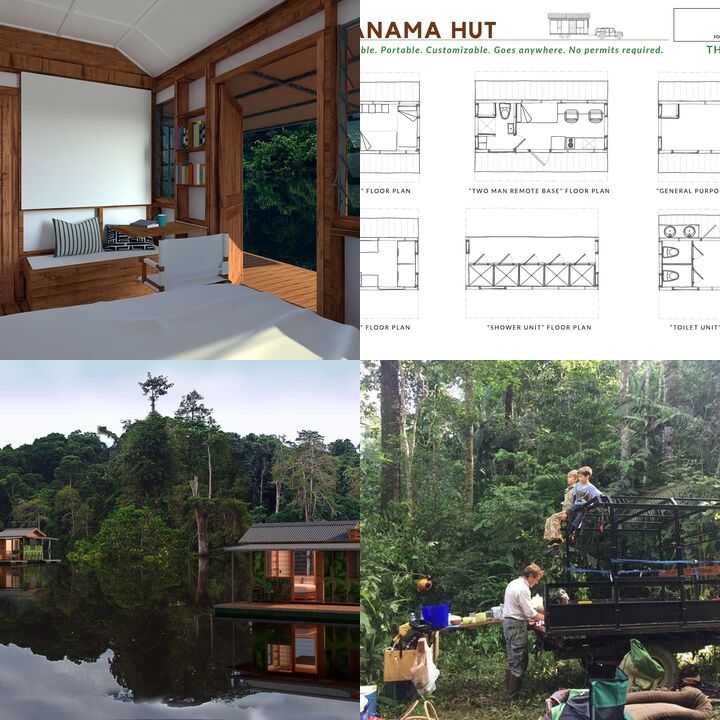Mobile Modular Field Labs
The Problem
Field biologists and conservationists are faced with a paradox: The goal of their work is to protect and understand natural ecosystems, but the mere act of accessing their field sites generally requires some amount of environmental destruction. Almost all travel for field biology relies on the burning of fossil fuels, which are destructive not only in the original drilling, but also in the pollution they give off into the very environments being studied. Moving vehicles back and forth between field sites also introduces physical destruction and noise pollution to natural areas which may negatively impact the work being done to begin with. Additionally, most conservationists and field biologists are constrained for time and space by the samples they collect. Researchers need to get to the sites, collect their samples, and get them back to labs for processing within a limited time-window. This means that these trips to field sites are often a constant, daily commute which takes a toll on the environment (as well as the researcher’s and their projects!). Like a surgeon cutting through healthy flesh to find a disease, these researchers will never be able to completely stop causing some damage to get to the places they study, but we can work to greatly reduce the damage caused. Instead of having thousands of researchers around the world commuting between field sites just to bring samples back to the laboratory, we think that the whole laboratory should be brought to the field.
Our Proposal
The future of the biological field station is not large fancy lab dropped in the middle of a jungle, but rather a network of mobile laboratories distributed throughout an ecosystem. To tackle this problem, we are combining Digital Naturalism Laboratories’ previous research in Mobile Makerspaces like the Philippines "BOAT Lab" (https://www.youtube.com/watch?v=n0L-SNO4A5w) with the decades of experience that the sustainable architecture firm, Cresolus (https://www.cresolus.com/), has experience building in building tropical architecture like homes and field stations in national parks. We are creating modular, mobile laboratories that scientists can bring directly to their field sites around the world. These laboratory “Pods” can be towed or floated to field sites deep in forests or up rivers while withstanding inclement weather or hazardous terrain. Advances in sustainable energy harvesting coupled with the miniaturization of technology means that researchers can process their data and samples on-site (even genetic sampling labs can be miniaturized!). Thus field biologists and conservationists can make fewer unnecessary trips back and forth between the field and lab and increase their productivity while minimizing their own footprint in these areas. We have already tested functional prototypes of these modular labs with many researchers and conservationists around the world including those from the Smithsonian, National Geographic, and many major universities.
We Assume that...
There will be a demand for on-site research laboratories that can be quickly deployed to many locations
The challenges we encounter in our nearby jungle field sites will help us deal with challenges posed in other tropical ecosystems
The demand for these mobile labs will be great enough to spur behavior change in greater numbers of conservationists and field biologists.
Constraints to Overcome
In our early research (https://dl.acm.org/doi/abs/10.1145/3196709.3196748), we established a hierarchy of needs for labs that starts with 1) Protection 2) Organization 3) Work Surfaces 4) Light 5) Information Access 6) Power Most people we discuss this challenge with automatically assume that getting power to a mini-modular field station deep in a remote field site would be the biggest challenge, but actually with solar power, pre-charged battery banks, inverters, and sustainable designs (e.g. passive cooling), getting power to the research equipment will not be our main challenge. Instead the key aspects of the design are creating a modular system that can facilitate the research of many different types of scientists and conservationists while keeping the sensitive tools protected, organized, and easy to work with. We already have many tested and experimental designs with workstations and lab equipment, for example, that expand from a trailer or pack into modular pelican cases.
Current Work
We already have functioning prototypes tested with scientists in key research areas (Pipeline Road). Our goals for the very next stage of the project are to do another round of more formalized testing and evaluation and to develop further features to add to the pods’ designs. We aim to enroll existing scientist clients such as such as Dr. Rachel Page’s Bat Lab with the Smithsonian Tropical Research Institute, and Corey Tarwater’s Avian Ecology lab from the University of Wyoming who both do extensive field work on Pipeline road. We will provide their researchers with reduced rate use of the pods. Modular features that we intend to design into the projects that we will be working on over the next several months include: -Mesh networking -Safety equipment/signaling -Sterile lab -Expandable Flight Cages -Dry ice storage / Peltier Coolers -Expandable work stations -Built in 360-camera traps / Acoustic monitoring
Current Needs
To complete our next steps, we primarily need a little bit of funding to carve out some design time between our two organizations to dedicate to further develop the prototypes we already have. We already have most of the materials, electronics, field sites, and evaluators available, we just need time to put these together and continue testing and sharing these designs.
